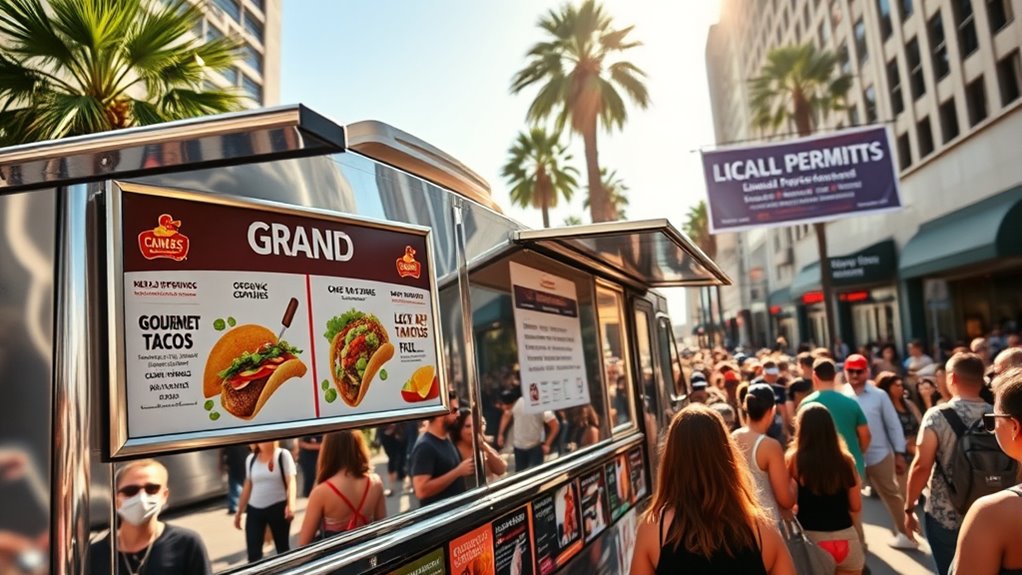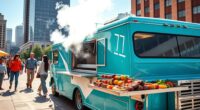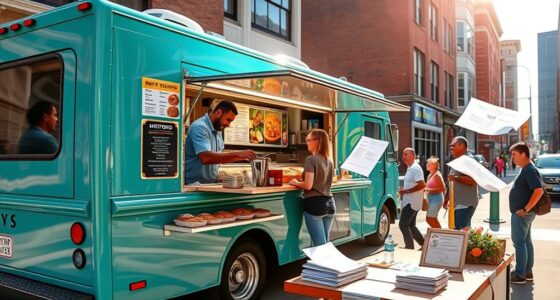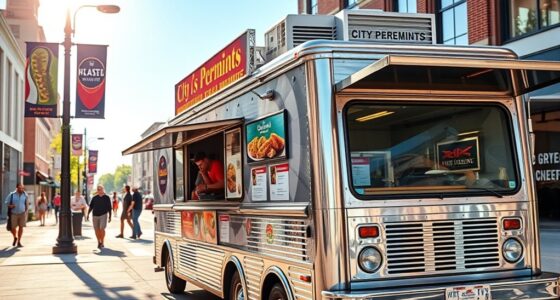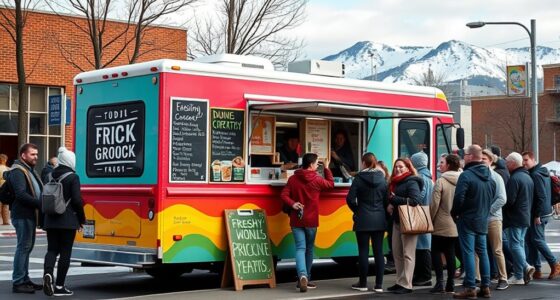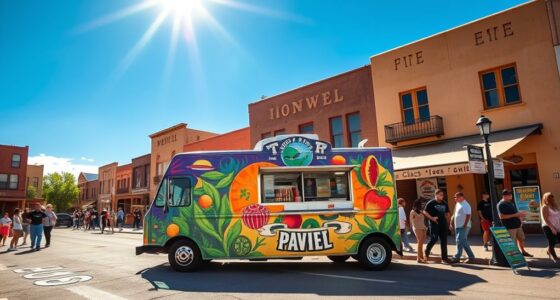To open a food truck in Los Angeles, you’ll need permits from the LA County Department of Public Health and a business license, plus vehicle registration and a food safety certification. Costs vary from $30,000 for a used truck to over $175,000 for a new one, plus permit fees and marketing expenses. Choosing busy locations like offices or event venues boosts your chances, and a well-crafted menu along with strong marketing helps attract customers. Keep exploring to learn the essential steps for success.
Key Takeaways
- Secure necessary permits and licenses from LA County and local authorities, including health, business, and vehicle registration.
- Budget $30,000–$175,000 for truck purchase, equipment, permits, and marketing expenses.
- Choose high-traffic locations like office areas, events, or tourist spots, considering zoning and parking regulations.
- Develop a simple, versatile menu that complies with health standards and appeals to diverse customer preferences.
- Use social media, geo-targeted ads, and local partnerships to promote your food truck and attract steady customers.
Navigating Permits and Licenses for Your Food Truck
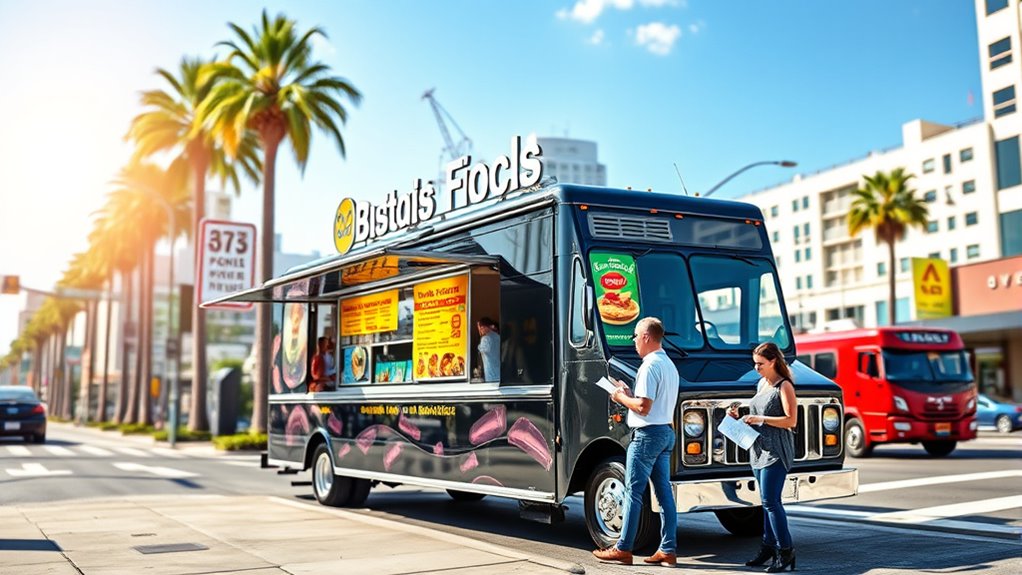
Getting your food truck up and running in Los Angeles requires maneuvering a series of permits and licenses. First, you’ll need a Mobile Food Facility Permit from the Los Angeles County Department of Public Health, which involves submitting an application, supporting documents, and paying fees based on your truck’s equipment and menu. You’ll also need a valid business license from the city or county, possibly multiple if you plan to operate in different areas. Vehicle registration from the DMV is essential to prove legal ownership and meet California regulations. At least one employee must hold a food safety certification, such as a food handler’s or manager’s license. This certification is a requirement for at least one owner or employee to demonstrate proper food safety knowledge. Additional permits, like a seller’s permit and fire safety clearance, might be necessary to guarantee full compliance with local health and safety standards. Familiarizing yourself with health and safety standards can help ensure your compliance with all regulations.
Estimating Costs for Starting Your Mobile Food Business

Estimating the costs to start your mobile food business involves understanding a range of expenses, from purchasing and customizing a truck to obtaining necessary permits and equipment. First, the truck itself can cost between $30,000 for used models and up to $175,000 for new ones, with customization adding $20,000 to $50,000 depending on equipment. Second, kitchen setup expenses, including grills, fryers, and refrigeration, can total $5,000 to $20,000. Third, licensing and permits in Los Angeles range from $590 to over $2,400, with additional legal and inspection fees. Permits and licenses are essential for legal operation and vary based on local regulations. It is also important to consider community resilience when planning your business, as strong community ties can support your success and adaptability during unforeseen challenges. Ultimately, marketing and technology, like POS systems and branding, typically require $1,000 to $5,000 upfront. Planning for these costs ensures a realistic budget and smoother launch.
Choosing Prime Locations to Maximize Your Reach
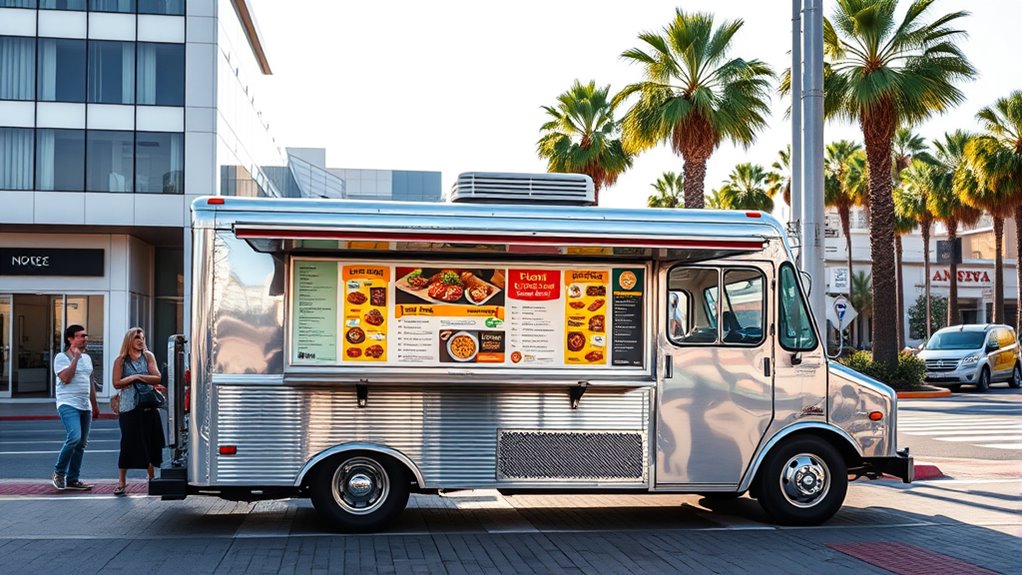
Choosing prime locations is essential to maximizing your food truck’s visibility and sales in Los Angeles. Focus on high-traffic areas like office districts, residential complexes, event venues, and tourist hotspots such as Hollywood or Santa Monica. These spots attract steady crowds seeking quick, delicious options. Additionally, understanding tuning can help ensure your vehicle runs smoothly in various conditions, optimizing your operational efficiency.
| Location Type | Key Benefits |
|---|---|
| Office Districts | Heavy lunchtime traffic, professionals on the go |
| Residential Complexes | Evening demand from residents |
| Event Venues & Festivals | Large crowds, temporary high-volume sales |
Be aware of zoning rules, parking restrictions, and permits specific to each location. Partner with local businesses or food truck parks to boost visibility and secure consistent spots.
Crafting a Menu That Delights and Complies
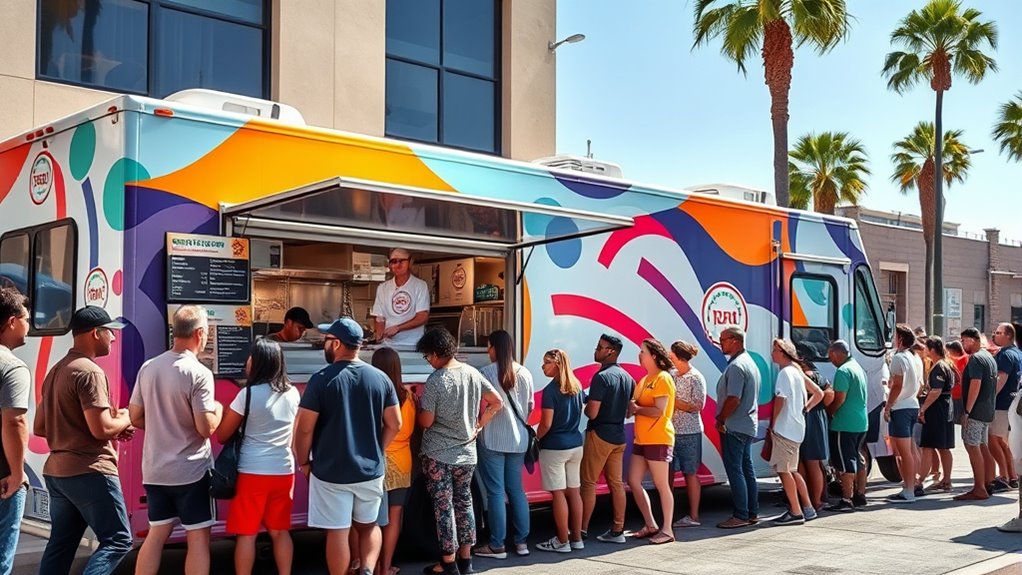
Creating a menu for your Los Angeles food truck requires careful planning to guarantee each item is both appealing to a diverse customer base and compliant with local health regulations. To do this effectively, consider these key points:
- Choose dishes that can be prepared and served within your truck’s limited space and equipment capabilities.
- Include both perishable and non-perishable items, ensuring perishable foods are properly labeled, refrigerated, and used before their “Day Prepared For” date.
- Avoid complex preparations or foods requiring extensive cooking times to maintain quick service and health standards.
- Design your menu to cater to various dietary restrictions and preferences, broadening your appeal without increasing operational complexity.
- Being aware of local health regulations and food safety standards is essential for ensuring compliance and avoiding potential legal issues.
Effective Marketing Strategies to Grow Your Customer Base
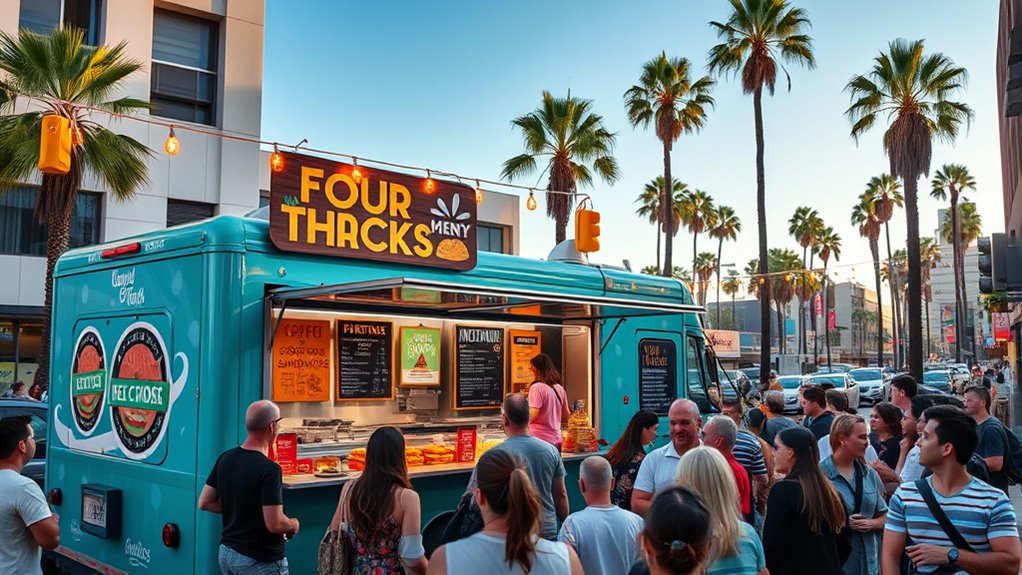
To effectively grow your customer base, leveraging social media marketing is essential. Use multiple platforms like Instagram, Facebook, Twitter, and YouTube, focusing on where your target audience is most active. Post regularly with real-time updates about your truck’s location, menu changes, and upcoming events to keep followers engaged. Implement paid social media ads with geo-targeting to attract nearby potential customers and drive immediate foot traffic. Host interactive campaigns such as giveaways, contests, or raffles to boost engagement and brand awareness. Maintain a consistent brand voice and visual identity across all channels to strengthen recognition. Collaborate with local events, influencers, and other food trucks to expand your reach. These strategies will help you build a loyal customer base and increase your visibility in Los Angeles. Additionally, regularly analyzing your social media performance using analytics tools can help refine your content and advertising strategies for better engagement and ROI to optimize your marketing efforts. Incorporating AI-driven social media analytics can provide deeper insights into customer preferences and behavior, allowing for more targeted and effective campaigns.
Frequently Asked Questions
How Long Does the Permit Approval Process Typically Take?
The permit approval process generally takes anywhere from 30 to 45 business days if your documents are complete and correct. Food permits might take longer due to health inspections and additional requirements. Factors like application accuracy, zoning compliance, and city workload can cause delays. Using permit expeditors can speed things up, ensuring you avoid common pitfalls and navigate the process more efficiently. Be prepared for potential delays depending on your specific situation.
Are There Specific Vehicle Requirements for Food Trucks in Los Angeles?
For your food truck to flourish in LA, you gotta fulfill specific vehicle requirements. You must register your vehicle with the DMV, ensuring it matches your business info, and secure a valid Public Health Permit. The truck needs to pass a plan check, meet safety standards, and display certification stickers. Plus, it must conform to local land use laws, avoiding illegal parking and blocking pathways, so your food travels trouble-free.
Can I Operate a Food Truck Without a Commissary?
You can’t operate a food truck without a commissary in Los Angeles. The health department requires all trucks to have a signed agreement with a licensed commissary for storage, cleaning, and food prep. Operating without one risks permit denial or revocation, fines, and legal issues. To stay compliant and ensure your truck’s legality, you must partner with an approved commissary that meets all safety and sanitation standards.
What Insurance Coverage Is Recommended for Food Truck Businesses?
You should consider extensive insurance coverage for your food truck. Commercial auto insurance is essential for vehicle damages and liability. General liability protects against customer injuries and food-related claims, while workers’ compensation covers employee injuries. Additionally, look into product liability, tools and equipment coverage, and damage to rented properties. These insurances reduce your financial risks, help you meet legal requirements, and ensure your business stays protected against unexpected incidents.
Are There Restrictions on Operating Hours for Food Trucks in LA?
They say “timing is everything,” and in LA, that’s especially true for food trucks. You can operate without strict daily hours, but parking and dispensing food are limited. You can’t stay at residential spots over 30 minutes or at commercial locations beyond an hour without moving half a mile away. Violating these rules leads to fines. So, plan your routes carefully to stay compliant and keep your business running smoothly.
Conclusion
Starting your food truck journey is like planting a seed—you need the right permits, a tempting menu, and clever marketing. As you nurture your truck through each step, remember that your success blooms from dedication and adaptability. Like a tree growing strong against the winds, your business will flourish with patience and passion. Embrace this adventure, and watch your dreams blossom into a thriving staple on Los Angeles streets.
